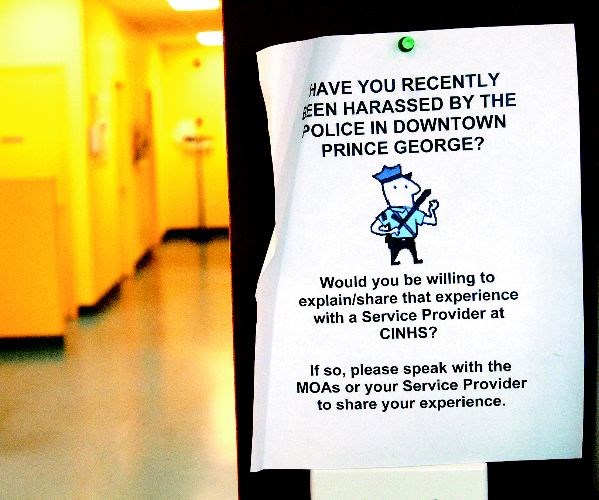The Central Interior Native Health Centre is defending its decision to ask their clients if they are being "harassed" by the police in downtown Prince George.
The question is posed on a poster hanging in the foyer of the health centre, located on the corner of Fourth Avenue and George Street.
The poster - which has displeased the RCMP - features a cartoonish police character slapping a baton in his hand. It's been up for about one month, and remained in place on Wednesday morning.
The decision to ask clients if they have been harassed by the police recently, and to share or explain that experience to the staff at the health centre, is the result of a perception that some downtown people feel like they are being harassed, said Central Interior Native Health Centre executive director Murry Krause.
"We wanted to speak in the language they understand," said Krause.
While he said that some might find the poster provocative, the centre feels justified in seeking information.
Krause, who is also a city councillor, says they are trying to determine if the harassment perception is founded in fact. He said he has passed on about three complaints to the police, but did not provide details of their nature other than to say that the people believe they are being pushed out of downtown.
Krause stressed it is important that people who use the services like the native health centre have access to them.
The perception that people who live on the streets, or hang out on the streets, some of whom drink openly or create disturbances, are being harassed by the police, has emerged since the RCMP deployed a six-officer downtown enforcement unit eight months ago.
Cpl. Kent MacNeill, who heads the unit, acknowledged as much during a more-than-two-hour tour with The Citizen of the downtown last June.
The unit was created as a result of a recommendation from the mayor's task force on downtown improvement in 2009. (Krause, mayor Dan Rogers, councillors Cameron Stolz and Shari Green, as well as business, RCMP, Prince George Native Friendship Centre and Northern Health representatives sat on the task force).
Since the unit has taken to the streets incidents downtown have dropped significantly, according to the RCMP.
MacNeill said Wednesday that the increased police vigilance is being mistaken in some quarters for harassment, in part, because some people had been getting away with illegal activities downtown.
Several serious repeat criminal offenders - about five - have been banned from the downtown. However, these people can still get permission to access social services downtown, noted MacNeill.
"Everybody's welcome downtown. Just don't commit crimes," said MacNeill.
Despite the difference of opinion over the poster, the RCMP and native health centre say they continue to communicate. There has been one meeting between the RCMP and social service providers and another is being planned. Recently, the RCMP were invited to a potlatch at the drop-in centre, Fire Pit, downtown.
MacNeill said they are sensitive to the social issues downtown, and are trying forging relationships with social agencies.
Krause stresses the goal is to find solutions, including, perhaps, finding mechanisms to deal with specific individuals, noting that a policing approach is not always necessarily the best approach. He noted that many people on the street have mental health issues and addictions. If someone is permanently brain damaged, you can't cure that, observed Krause.
There may be a need for more services, he noted.



